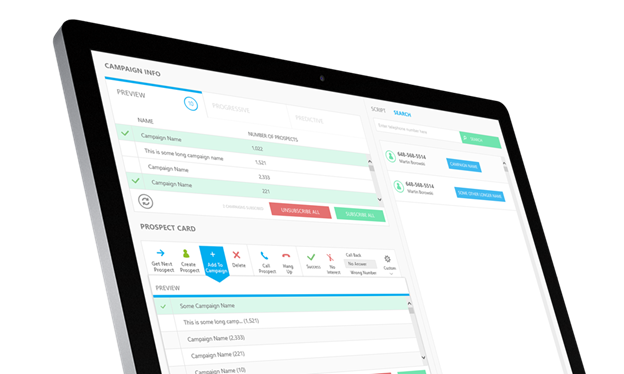Cloud Contact Center: Best Practices and Software for 2025
by Kent Mao | Published On March 27, 2024 | Last Updated March 18, 2025

Cloud contact centers provide an agile, scalable platform for customer service.
Cloud contact centers offer many benefits over traditional on-premises solutions. They're also experiencing massive growth, with the Contact Center as a Service (CCaaS) industry expected to reach a value of $15.6 billion by 2027.
As digital transformation continues, we’re beginning to see some clear best practices that set leading contact centers apart from the competition. Implementing these best practices can help supercharge your contact center and streamline both your operations and your customer experience.
Here’s your guide to best practices for cloud contact centers in 2025 as well as the best cloud-based solutions on the market today.
What is a Cloud Contact Center?
A cloud contact center is an internet-based platform that empowers businesses to support and engage customers. It enables businesses to interact with customers across different channels, such as voice calls, social media, live chat, and more.
Unlike traditional on-premises contact centers, cloud contact centers utilize cloud computing technology. This means businesses can access their contact center software and data over the internet instead of hosting them on their own servers. As a result, cloud contact centers are far more flexible, scalable, and cost-effective than traditional contact center solutions.
This flexibility allows them to integrate with a range of critical business tools, from unified communications platforms to CRM software and workforce management apps. By integrating with different tools for productivity, reporting, and resource management, cloud contact centers help companies optimize their customer service and drive business growth.
5 Best Practices for Cloud Contact Centers
 In today's fast-paced business environment, customer service is a critical aspect of maintaining a competitive edge. As businesses increasingly turn to cloud-based solutions for their contact center needs, it's essential to stay updated on the best practices to ensure efficiency, flexibility, and customer satisfaction.
In today's fast-paced business environment, customer service is a critical aspect of maintaining a competitive edge. As businesses increasingly turn to cloud-based solutions for their contact center needs, it's essential to stay updated on the best practices to ensure efficiency, flexibility, and customer satisfaction.
As we move into 2024 and beyond, we’ve identified 5 best practices that can help your organization achieve better customer experiences with a cloud-based contact center.
1. Switch from on-premises to cloud
If you’re still using a legacy contact center solution that isn’t cloud-based, now is the time to switch.
It’s true, the transition to the cloud hasn’t always been easy for business leaders. Larger companies often struggle to migrate away from legacy systems due to significant existing investments and stringent compliance standards. However, analysts like Gartner predict the adoption of cloud-based technologies will continue to rise, with more than 85% of organizations fully migrating to the cloud by 2025.
A cloud-based contact center gives businesses the ability to futureproof their approach to customer service. It also offers limitless scalability, the flexibility to leverage as many channels as needed to serve your audience, and a simplified management experience.
Plus, switching to a cloud contact center is usually cost saving in the long run. While the initial transition to the cloud can be expensive due to setup fees, adopting a pay-as-you-go subscription model can help companies reduce costs by switching from a capital expenditure to operating expenditure model.
Cloud contact centers are often priced by the number of agents, which offers you the flexibility to scale up and down depending on your needs.
2. Leverage AI-powered automation tools
In 2024, artificial intelligence has proven itself to be a vital tool in the customer experience toolbox. Many companies have begun to use AI in various ways in order to streamline customer service and automate simple tasks.
For instance, chatbots and virtual assistants can provide 24/7 service to customers across a range of channels, freeing up agents to focus on more complex tasks. With the rise of generative AI chatbots like Google’s Gemini and Microsoft Copilot, companies will soon have even more ways to deliver personalized, efficient experiences to customers using the power of AI.
But it’s not just customer self-service that can benefit from AI. Leading cloud contact center providers are starting to implement AI tools in their ecosystem to help automate contact center processes. For example, AI-powered tools can analyze customer interactions for quality monitoring, track compliance with industry standards, and help agents with wrap-up tasks.
Artificial intelligence can even make your IVR system more effective, with automated speech recognition, intelligent routing, and prompts for your outbound campaigns.
3. Create personalized experiences
According to McKinsey, 71% of customers now expect a high level of personalization during interactions with companies, and 76% feel frustrated when they don’t get it. Now that organizations have access to endless amounts of data, consumers expect every interaction to be tailored to them.
These days, customers expect companies to serve them on the channel of their choice. They also expect companies to keep a record of their conversations as they move between platforms to avoid repeating themselves. Many also want to receive personalized recommendations for products and services.
To meet these customer expectations and unlock the benefits of hyper-personalization, contact center leaders must have the right data. That’s why many cloud contact centers offer access to real-time monitoring tools, historic reporting, and call recording and transcription tools that assist in mapping the customer journey. Integrating your contact center with a CRM also ensures your team members can access the insights they need to deliver highly personalized experiences at scale.
4. Prioritize data security and compliance
It seems like data security makes the list of trending topics every year, and 2024 is no different. While regulatory bodies have always held companies accountable for protecting customer data, ensuring information remains secure has gotten harder now that organizations are collecting more data across multiple channels, and cybercriminals have gotten smarter.
As consumers become more concerned with protecting their private data, regulatory leaders are placing more pressure on companies to upgrade their security measures. This means not just implementing end-to-end encryption methods in your contact center, but leveraging tools for real-time compliance and threat monitoring, and taking proactive steps to protect your buyers.
At the same time, businesses also need a strategy for determining how they’ll store data and keep vital information protected with efficient backup and disaster recovery plans.
5. Invest in agent training, development and engagement
The evolution of the cloud contact center has transformed the agent role as well. With the rise of AI and automation, agents are spending less time dealing with repetitive customer queries. Instead, they’re focusing on more complex issues and requests.
What’s more, contact center agents are constantly being exposed to new tools and technologies they need to learn and master. This makes investing in agent training, development, and upskilling essential in 2024.
Companies need to build a comprehensive strategy for ensuring their team members can thrive in their roles. This could mean implementing monitoring tools to track potential strengths and weaknesses in team member performance, as well as building robust training programs. Incorporating gamification into your contact center can also boost team morale and performance.
Additionally, workforce engagement management (WEM) software can help organizations optimize and keep track of their resources. By offering tools for quality management and performance tracking, WEM solutions empower your agents to achieve peak levels of productivity.
Best Cloud Contact Center Software for 2025

Contact centers have come a long way since the era of on-site servers and desktop phones.
These days, cloud-based contact centers offer traditional tools, such as IVRs and automatic call routing, alongside much newer features. These include extensive reporting and real-time monitoring tools, workflow designers for automation, and access to AI-powered chatbots, to name just a few.
For 2025, we’ve identified some of the top cloud contact center vendors with best-in-class features and solutions. Here are our top picks for cloud contact center excellence.
ComputerTalk ice
ComputerTalk’s ice Contact Center helps businesses create seamless and consistent omnichannel journeys across voice, web chat, email, and SMS. The ice Contact Center also integrates natively with Microsoft Teams.
With this comprehensive toolkit, companies gain access to innovative real-time and historical reporting tools to help them boost the ROI of their contact center. Plus, ice Contact Center can integrate with a range of CRM and workforce management solutions as well as other software tools for an all-in-one CX management solution.
With modules covering everything from outbound campaign management to surveys, administration, and workflow design, ice Contact Center has everything you need to optimize your customer experience.
Genesys Cloud
Genesys Cloud simplifies customer communication with support for multiple channels, automatic routing, and distribution. Companies can use Genesys to create chatbots and intelligent voice response systems, offer immersive customer service through co-browsing and screen sharing, and even unify teams.
The built-in unified communications and workforce optimization tools give companies and their agents a single interface where they can manage every part of the customer experience and enhance employee engagement. What’s more, Genesys integrates with CRM systems, offers access to a range of analytics and reporting tools, and supports outbound CX campaigns.
Five9
Five9 is another vendor that produces contact center software enhanced with generative AI and automation capabilities. The cloud-based contact center comes with an intelligent virtual agent for self-service functionality and real-time coaching via the Agent Assist application.
With Five9, companies can connect with customers across any channel, preserving context as customers move from one platform to the next. What’s more, Five9 also offers its own workforce management and employee engagement tools with gamification capabilities, interaction analytics, and quality management. The system also integrates with CRM, unified communications, and other business applications.
Talkdesk CX Cloud
Specializing in the era of AI-driven contact center solutions, Talkdesk produces omnichannel software that allows organizations to enhance and automate every step of the customer journey. Companies can leverage AI tools for self-service, omnichannel engagement, employee collaboration and workforce engagement. The company also offers inbound and outbound calling along with robust reporting and analytics tools.
Talkdesk’s contact center is highly flexible, with pre-built integration options and a reliable global communications network. Talkdesk also gives companies access to no-code and low-code tools, like the Talkdesk Builder for building customized workflows.
Nextiva
Nextiva’s cloud contact center platform enhances customer experiences with omnichannel connectivity and robust automation solutions. Nextiva combines a comprehensive phone system with self-service customer experience tools, and the ability to deploy generative AI in a single click.
Companies can manage all their agents in one place with native workforce optimization, and leverage both inbound and outbound contact center technology. Plus, Nextiva’s intelligent assistants can help with routing calls and customers to the correct agents based on various filters.
Other features include everything from in-depth call analytics to call flow builders, customer satisfaction surveys, and voicemail.
To learn more about the many advantages cloud contact centers can offer your business, speak to an expert today.
More from our blog
 It was a fast, very satisfying 11+ years leading to retirement after spending almost 30 years in a large telecom organization, with some shorter terms with hardware and software focused companies similar in size to ComputerTalk.
It was a fast, very satisfying 11+ years leading to retirement after spending almost 30 years in a large telecom organization, with some shorter terms with hardware and software focused companies similar in size to ComputerTalk.
 Growing up in the Philippines, back when technology was still evolving, pursuing a career was limited to a few choices: becoming a Doctor, Nurse, Lawyer, Engineer, or Teacher. Growing up, I always knew that I wanted to pursue a career...
Growing up in the Philippines, back when technology was still evolving, pursuing a career was limited to a few choices: becoming a Doctor, Nurse, Lawyer, Engineer, or Teacher. Growing up, I always knew that I wanted to pursue a career...
 In 2025, nothing has a bigger impact on any company’s chances of success than their approach to customer experience. Every interaction you have with a customer, whether it’s a sales call or a response to a service request, can make...
In 2025, nothing has a bigger impact on any company’s chances of success than their approach to customer experience. Every interaction you have with a customer, whether it’s a sales call or a response to a service request, can make...

